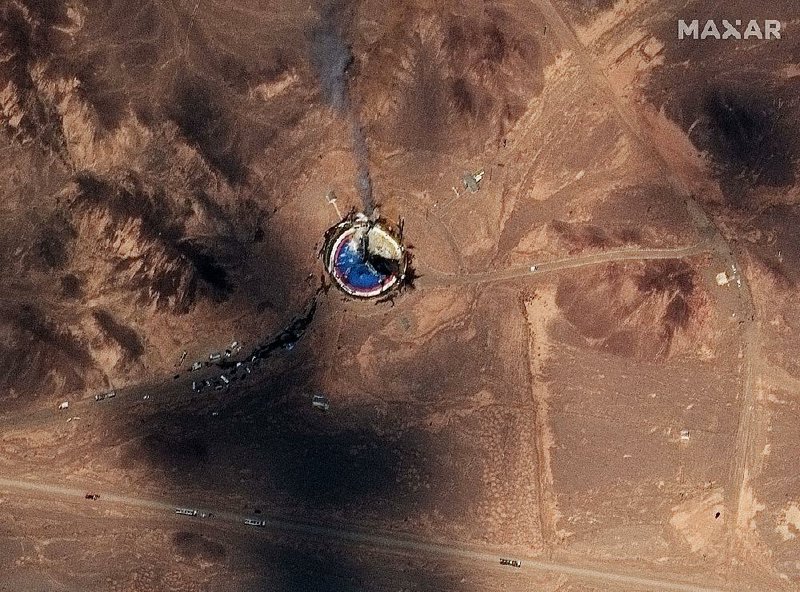DUBAI, United Arab Emirates -- A rocket at an Iranian space center that was to conduct a satellite launch criticized by the U.S. apparently exploded Thursday on its launch pad, satellite images show, suggesting the Islamic Republic suffered its third failed launch this year alone.
State media outlets and officials did not immediately acknowledge the incident at the Imam Khomeini Space Center in Iran's Semnan province.
However, satellite images by Planet Labs Inc. showed a black plume of smoke rising above a launch pad there, with what appeared to be the charred remains of a rocket and its launch stand. In previous days, satellite images had shown that the launch pad had been repainted blue.
On Thursday morning, half of that paint apparently had been burned away.
"Whatever happened there, it blew up and you're looking at the smoldering remains of what used to be there," said David Schmerler, a senior research associate at the Middlebury Institute of International Studies.
Schmerler said the images of the space center suggested that the rocket either exploded during ignition or possibly briefly lifted off before crashing back down on the pad. Water runoff from the pad, likely from trying to extinguish the blaze, could be seen along with vehicles parked nearby.
NPR first reported on the satellite images of the apparent failed launch at the space center, some 150 miles southeast of Iran's capital, Tehran.
Iranian satellite launches had been anticipated before the end of the year.
In July, Javad Azari Jahromi, Iran's information and communications technology minister, said that Tehran planned three more launches this year, two for satellites that do remote-sensing work and another that handles communications.
The satellite launched Thursday was believed to be the telecommunication satellite Nahid-1, which authorities planned to put in orbit for 2½ months. Nahid in Farsi means "Venus."
The semiofficial Mehr news agency quoted Jahromi on Aug. 13 as saying that the Nahid-1 was ready to be delivered to Iran's Defense Ministry, signaling a launch date for the satellite likely loomed. Iran's National Week of Government, during which Tehran often inaugurates new projects, began Saturday.
Earlier on Thursday, Iranian Defense Minister Gen. Amir Hatami told the state-run Islamic Republic News Agency that the country's satellite activities were "being done in a transparent way," responding to media reporting on activity at the space center.
"Whenever activity and research bear successful results, we will announce the good news," Hatami said. Iran at times in the past hasn't acknowledged failed launches.
The apparent attempt to launch the Nahid-1 comes after two failed launches of the Payam and Doosti satellites in January and February. A separate fire at the Imam Khomeini Space Center in February also killed three researchers, authorities said at the time.
"I think it is certainly an image problem," said Michael Connell, an Iran analyst at the Arlington, Va., nonprofit research organization CNA. "I think it's going to embarrass the Iranian space agency. On the other hand though, getting a satellite into space ... takes time."
Over the past decade, Iran has sent several short-lived satellites into orbit and in 2013 launched a monkey into space.
The U.S. alleges such launches defy a U.N. Security Council resolution calling on Iran to undertake no activity related to ballistic missiles capable of delivering nuclear weapons.
Iran, which long has said it does not seek nuclear weapons, maintains its satellite launches and rocket tests do not have a military component. Tehran also says it doesn't violate the U.N. resolution as it only "called upon" Tehran not to conduct such tests.
Information for this article was contributed by Nasser Karimi of The Associated Press.
A Section on 08/30/2019
